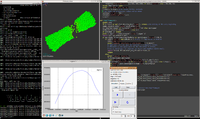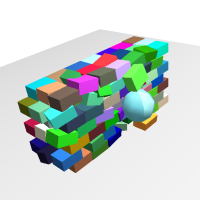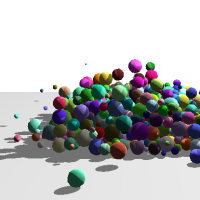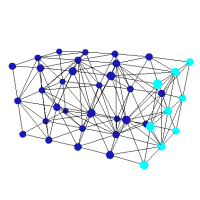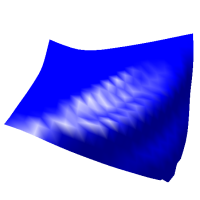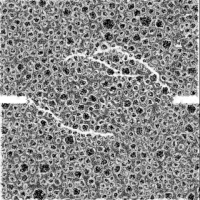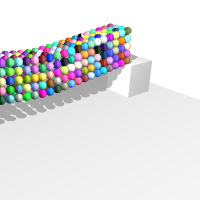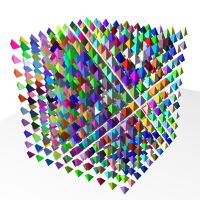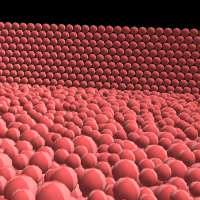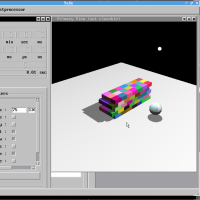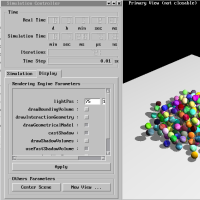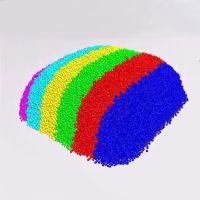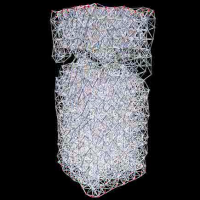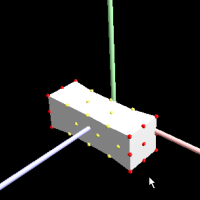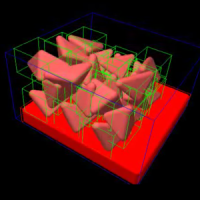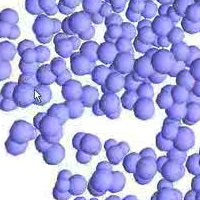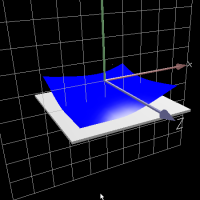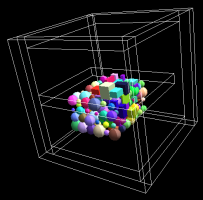Difference between revisions of "Screenshots and videos"
From Yade
| Line 69: | Line 69: | ||
== Ball Mill - 125 000 spheres == |
== Ball Mill - 125 000 spheres == |
||
| − | {{# |
+ | {{#evp:youtube|DsLd7lY3LAQ}} |
A sample of simulation of movement of 125 000 spheres with YADE. |
A sample of simulation of movement of 125 000 spheres with YADE. |
||
Revision as of 11:07, 14 June 2010
|
<categorytree mode=pages>Screenshots</categorytree> |
If you are working with yade, please upload some of your screenshots to show others your work!
Screenshots
Uniaxial tension/compression test
This example can be found in examples/concrete/uniax.py
Simple Spring
First implemented model was simple spring. It handles collision between rigid bodies of arbitrary shape (only sphere and box are currently implemented). This very primitive model served as testing ground for yade framework design.
Discrete Element Method
A first real-world application of Spherical Discrete Element Method is implemented, with a catchy name Yade OpenDEM. Handles shearing forces between spheres, cohesive forces with modified mohr-coulomb criterion. This is a reimplementation from ground-up of SDEC program, which has been used for over ten years in University of Joseph Fourier in Grenoble, and many PhDs were done with it.
Finite Element Method
First implementation of Finite Element Method. Using tetrahedron element with small deformations. This is a proof-of-concept showing that FEM is possible with yade, and we hope that later yade will be extended with more FEM-based models.
Mass Spring System
This is a very simple mass spring system, used to model a cloth. Springs with given stiffness are connected at nodes, we have done it as a quick way to show that cloth calculations are also possible with yade, but this model is by no means serious.
Lattice Geometrical Model
This model was written as a PhD work of one of the yade authors. Is aims to model fracture process of concrete, giving useful real-world predictions about fracturing of speciemens under heavy load.
Discrete Element Method with Local Moment Law
Discrete Element Method has been extended with law of conversion of momentum at the contact point. Resulting in a complete model for simulations of spherical elements. This has opened new broad variety of model applications, including deformable non-rigid body simulations, concrete and steel modelling. And later - after yade will have non linear models implemented - other kinds of plastic, viscoplastic, elastoplastic behaviours using spherical elements.
Tetrahedron Discrete Model
This model is a PhD work of one of yade authors. It is not complete yet, but aims to model rocks with an application for cliff stability, giving useful real-world predictions whether the cliff will fall.
Other
Yade is now good enough to produce some results. Those results are at first compared with results from other numerical computations software, then with real-world experiments. Several articles are planned to be written about it. For now you can have a short glance at what kind of results we can produce so far. Bear in mind that this is just a quick look at screenshots and nothing more.
Videos
Ball Mill - 125 000 spheres
A sample of simulation of movement of 125 000 spheres with YADE. This simulation take 14h30m for 50 000 iterations on laptop with Intel(R) Core(TM)2 Duo CPU T8100 @ 2.10GHz processor and 2GB memory. So, perfomance was 0.95 iter/sec.
See yade script here (it need this stl-file for the mill shape.)
Ball Mill
See yade script. The mill shape is constructed parametrically from within the script itself.
Surface triangulation and filling
Sphere packing (regular) is generated to fit inside the horse-shaped triangulated surface (imported from file). The same horse is the used underneath, on which the spheres fall from above. Script is here
Sample Yade Session
Short example session of working with yade was recorded, due to filesize constraints it has been cut and is little faster. So to see exactly what happens you will have to use the 'pause' button in your video player.
If you wonder how to toggle axis, and grid - those are commands of qglviewer. It's 'a' and 'g'.
Second Sample Session, with DEM
A sample simulation with DEM was recorded, and displays just how yade looks like, when it is in use.
Discrete Element Method - 125 000 spheres
As first real-world application of yade Spherical Discrete Element Method is implemented. Handles shearing forces between spheres, cohesive forces with modified mohr-coulomb criterion.
125 000 spheres were generated in a cubical volume, and fell down in the graivty. The calculation took three days, and is available here in two versions - small and big.
Lattice Geometrical Model
This model is a PhD work of one of the yade authors. Is not complete yet, but aims to model fracture process of concrete, giving useful real-world predictions about fracturing of speciemens under heavy load.
On this video a small concrete speciemen is subject to uniaxial extension, and fracture process occurs in the middle.
Finite Element Method
Depending on the parameters of FEMBeam filegenerator, different nodes of the FEM beam can be moved, so here a tension simulation was performed.
Discrete Element Method based on Tetrahedrons
First effects of making a DEM simulation with tetrahedrons. It is still not working correctly and needs more work to be done.
Tetrahedrons with Interacting Geometry of Four Spheres
Another try at implementing tetrahedrons. This is just a simple example that demonstrates how to add new models to yade. Later it will become a part of yade manual, currently the instructions related to this example can be found here.
Also this video demonstrates new yade's capability: interactively moving/rotating objects inside the simulation.
Mass Spring System
This is a very simple mass spring system, used to model a cloth. Springs with given stiffness are connected at nodes, we have done it as a quick way to show that cloth calculations are also possible with yade, but this model is by no means serious.
Here you can see a video of some simulation performed with it.
Simple Spring
First implemented model was simple spring. It handles collision between rigid bodies of arbitrary shape (only sphere and box are currently implemented). This very primitive model served as testing ground for yade framework design.
Here you can see a video of some simulation performed with it. Particle segragation due to size can be observed.
Making Videos
Wondering how those videos were produced? Here's an explanation >>
